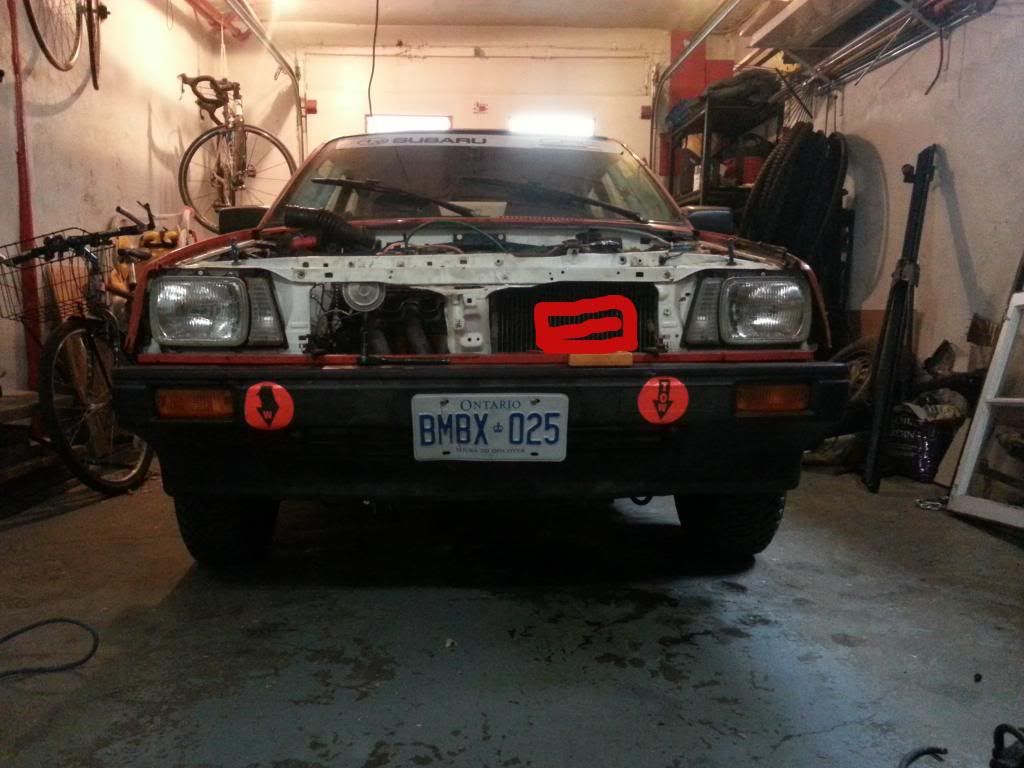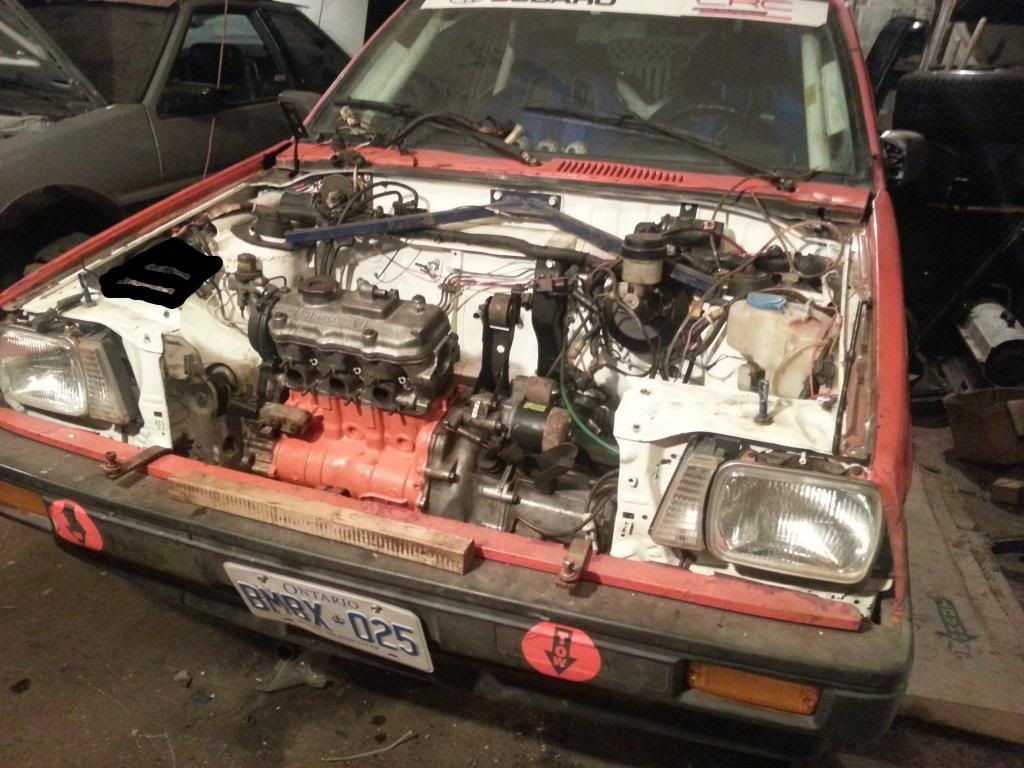School me in the ways of intaking fuel and air...
Posted by Mad Matt F
john vanlandingham John Vanlandingham Mod Moderator Location: Ford Asylum, Sleezattle, WA Join Date: 12/20/2005 Age: Fossilized Posts: 14,152 Rally Car: Saab 96 V4 |
Cool deal..The mighty Justy lives! Better not brag too much CARS Tech Genies might put back the min weight rule and you'll go broke just buying the 1200 lbs of lead.
John Vanlandingham Sleezattle, WA, USA Vive le Prole-le-ralliat www.rallyrace.net/jvab CALL +1 206 431-9696 Remember! Pacific Standard Time is 3 hours behind Eastern Standard Time. |
mulik52 Klim Verba Godlike Moderator Location: San Francisco, CA Join Date: 07/24/2013 Age: Settling Down Posts: 40 Rally Car: Audi 90Q 20V n/a |
|
Mad Matt F Matt Follett Senior Moderator Location: La Belle Province, Montreal Join Date: 03/13/2006 Age: Possibly Wise Posts: 646 Rally Car: Don't Laugh, the Justy is Fun! |
So next question...
"back in the day" we ran junk yard motors till they blew... which was generally after 1-2 rallies. They started with low oil pressure and ended with none... I always ran 20w50. Now I have a motor that makes 50lbs at start up idle and drops to just around 40 on 10w40 (factory spec'd weight). I haven't had time or the place to flog it much yet. Should I start out with 10w40 or move straight to 20w50 off the bat? Thoughts? Also I have two thoughts on where to mount the oil cooler... One is probably typical, in front of the rad, but it is a long run for hoses, and I'm worried about pumping loss over that long run with the tiny pump. Seen here: 
The other (where I'm leaning) is in the engine bay, with added louvers in the hood to vent and force air through. Shorter run, and more out of the way of damage should we do something stupid... and wouldn't hood louvers just scream "real rally car"  Seen here: Seen here:

I would put it in the open spot in front of the header, but there really isn't much clearance there, plus the heat from the header... Thoughts? Edited 1 time(s). Last edit at 11/18/2013 12:13AM by Mad Matt F. |
aj_johnson A.J. Johnson Super Moderator Location: Pendleton OR Join Date: 01/07/2011 Age: Midlife Crisis Posts: 1,381 Rally Car: 88 Audi 80 |
|
MRWmotorsports Martin Walter Elite Moderator Location: North Gower, Ontario, Canada. Join Date: 03/01/2006 Age: Ancient Posts: 450 Rally Car: Nissan 240SX |
|
Mad Matt F Matt Follett Senior Moderator Location: La Belle Province, Montreal Join Date: 03/13/2006 Age: Possibly Wise Posts: 646 Rally Car: Don't Laugh, the Justy is Fun! |
|
Cosworth Paulinho Ferreira Infallible Moderator Location: Charlotte, NC Join Date: 03/15/2007 Age: Midlife Crisis Posts: 721 Rally Car: Honda Civic |
Why do you want to run 20/50 oil on a stock motor? Its not going to do much aside from showing higher oil pressures on the gauge. I don't know what the bearing clearance is on those motors but it might not be an adequate oil to flow fast enough through the bearings to remove heat efficiently. I'm sure John will have a good word or two to add to this but I would stick to the factory recommendations unless the engine was rebuilt with looser tolerances. |
mulik52 Klim Verba Godlike Moderator Location: San Francisco, CA Join Date: 07/24/2013 Age: Settling Down Posts: 40 Rally Car: Audi 90Q 20V n/a |
If you put in a quality 10w40 oil it will be fine. You probably would run thicker oils back in the day because of shearing. By the end of the race, due to loads the oil would be much thinner than 50 weight. However, modern synthetics hold their weight very well, just look at the reports by Bob is the oil guy people, after thousands of miles with track days oils are still close to specs. With thicker oil you get more parasitic losses and potentially more foaming which are not good.
Klim |
john vanlandingham John Vanlandingham Mod Moderator Location: Ford Asylum, Sleezattle, WA Join Date: 12/20/2005 Age: Fossilized Posts: 14,152 Rally Car: Saab 96 V4 |
"Bobtheoilguy" is the epitome of intra-net assertion over fact. 99.9% is just people saying "I haven't see a problem with......." the thickness thing doesn't hold if you understand what the first number means. It means it pours like a 20W or a 15W at low temps---then thickens UP as temp rises---little microscopic polymers swell up and maintain the viscosity at higher temps. Internal clearances haven't changed---an obvious fact for those who build engines... What has driven this thinner and thinner first number is/was the gas guzzler tax and the "Corporate Average Fuel Economy" standards which means the average of what all the cars a company sells get for MPG. Lower the CAFE number by thinner oil or giving away thousands of little shit-box econo cars and they can sell more big high profit pig-cars. Some added on systems like variable cam systems ARE designed for thin oils, but rod and main and cam journals, cylinder wall to piston clearances are as they have been since the 1960s. Like everything else, horses for courses. Was Matt puttering down to Tim Hortons for another Family Pack of Tim's best, then sure whatever for oil... I think with a tiny little motor he will be driving with a huge size 14 shoe smashing the pedal thru thin tin-foil of the floor---constant max rpm... That means more heat. That means maybe he should think about elevated temps the oil will need to cope with.. Rally on gravel is slightly different than ordinary street driving (for most people). John Vanlandingham Sleezattle, WA, USA Vive le Prole-le-ralliat www.rallyrace.net/jvab CALL +1 206 431-9696 Remember! Pacific Standard Time is 3 hours behind Eastern Standard Time. |
mulik52 Klim Verba Godlike Moderator Location: San Francisco, CA Join Date: 07/24/2013 Age: Settling Down Posts: 40 Rally Car: Audi 90Q 20V n/a |
My thinking was based on the 50 vs 40 as the high temp viscosity number, as that is the number which would be of concern for racing. You are right that the first number is of no concerns here. My understanding is that the multigrade oils are made out hydrocarbons which attain a compact structure at low temps. At high temps this structure unfolds, yielding a bulkier hydrocarbon chain, which in essence means thicker oil. The point I was making is that at high temps/loads over time you will actually shear the hydrocarbons, breaking them into shorter chains. This will reduce your hot weight number, making for example a 50 weight oil a 25 weight in actuality. But from the reports (not opinions), as can be seen here for example: http://www.bobistheoilguy.com/forums/ubbthreads.php?ubb=showflat&Number=2774647
Modern good oils don't shear that bad, as can be seen in the above example, where the lad claims a number of track days on the oil and the viscosity is still within spec. Therefore I think one should be fine with a good 40 weight oil, and there is no need to change to a thicker oil unless that's what is called for by the manufacturer. But again, that's just my opinion. Klim |
Pete Pete Remner Infallible Moderator Location: Cleveland, Ohio Join Date: 01/11/2006 Age: Midlife Crisis Posts: 2,022 |
The oil doesn't get thicker, it just loses viscosity less.
20W50 - 20 means the oil flows at (0c?) the same as a 20 straight weight at that temp. 50 means the oil flows at (100c?) the same as 50 straight weight at that temp. Different scales. 0W60 is very close to not losing any viscosity at all with heat. Probably why BMW likes it so much. Pete Remner Cleveland, Ohio 1984 RX-7 (rallycross thing) 1978 Silence is golden, but duct tape is silver. |
john vanlandingham John Vanlandingham Mod Moderator Location: Ford Asylum, Sleezattle, WA Join Date: 12/20/2005 Age: Fossilized Posts: 14,152 Rally Car: Saab 96 V4 |
So solly round eye, Rallyanarchista "Seattle Scott" Koch and Nude Hampsteroid Graham "Graminal Cullen and his dear diddie Barry cullen are all smart chemical Injur-nears and took the time to splain to me'es about the polymers 9fricking plastic shavings!) that are the Viscosity Index Improvers.. Here read dis:
John Vanlandingham Sleezattle, WA, USA Vive le Prole-le-ralliat www.rallyrace.net/jvab CALL +1 206 431-9696 Remember! Pacific Standard Time is 3 hours behind Eastern Standard Time. |
Iowa999 no-one of consequence Professional Moderator Location: Florin Join Date: 01/06/2013 Posts: 395 |
|
MRWmotorsports Martin Walter Elite Moderator Location: North Gower, Ontario, Canada. Join Date: 03/01/2006 Age: Ancient Posts: 450 Rally Car: Nissan 240SX |
|
mulik52 Klim Verba Godlike Moderator Location: San Francisco, CA Join Date: 07/24/2013 Age: Settling Down Posts: 40 Rally Car: Audi 90Q 20V n/a |
This is true for synthetic and mineral oils. That's why some argue that getting the oil where the numbers are close to each other is better (like 15w-40 rotella), because 15w40 is 15 weight oil with additive added to make it 40 weight at high temp, and 0w60 is 0 weight oil with additive added to make it 60 at high temp.
Klim |
Sorry, only registered users may post in this forum.
Rally Anarchy © 2014 Corvus Digital –
Part of the AutoShrine Network –
Problems? Send an email to the Webmaster






